I have been wondering for a long time, does fasted training work for endurance sports? I need a really strong reason to stop eating carbs before, during and after exercise, so today I am going to review the evidence for and against fasted training. Does it help weight loss or performance or neither?
Early Benefits
In 1976 Alborg and Felig showed that when carbohydrates were consumed during exercise oxidation of glucose increased and lipolysis diminished (ie more carbohydrates were used as fuel and less fat).
In 1997 Horowitz found when carbohydrates were ingested before exercise that lipolysis (fat use) was suppressed…..leading to the idea for fasted Training
1983 Phinney and colleagues asked 5 cyclists to use a low carb <20 g day, high fat diet in training. Despite a ∼50% decrease in muscle glycogen concentrations with K‐LCHF, fat oxidation increased and performance was about the same
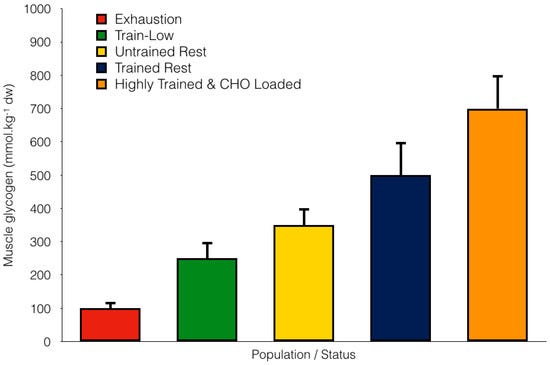
Fasted training is simply performing exercise when your body is in a catabolic state (ie food is not being digested). Typically fasting starts 3 -6 hrs after eating a substantial meal (especially high protein high fibre meal).
Does fasted training burn more fats?
Yes, fasted training pushes your body towards fat use. Training with low CHO may improve mitochondrial biogenesis and oxidative metabolism [41,42,43]. Moreover, a reduction of CHO availability during 3–10 weeks of training improved enzymatic activity involved in lipid oxidation in endurance athletes [44,45,46]. Usually this higher rate of fat oxidation increases the oxygen cost of exercise at race-pace intensities (link). Exercise science has pretty well established that performing fasted cardio burns significantly more fat than performing the same bout of cardio in a fed state. A 2016 systematic review and meta-analysis including 27 studies even concluded that: [link] “aerobic exercise performed in the fasted state induces higher fat oxidation than exercise performed in the fed state.” but your body will actually burn less fat later on in the day. [13] In 2011 Paoli showed again that fat-burning was higher during fasted versus fed cardio but then using the RER (Respiratory Exchange Ratio) they found the fasted group burned more fat during their exercise but they turned to burning more carbohydrate during the rest of the day.
Fasted Training: and Weight Loss
In 2014 Schoenfeld and colleagues found that when controlling for diet, that is the same amount of caloric deficit and macronutrient breakdown, over 4 weeks fasted and fed cardio resulted in the same amount of body fat loss.
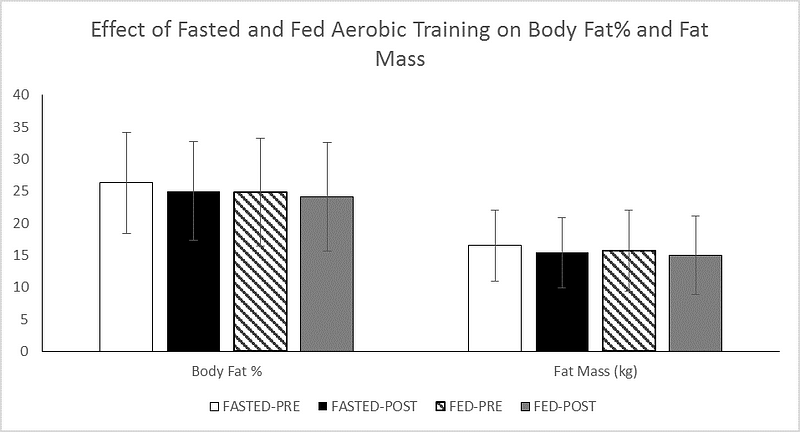
A meta-analysis published in 2017 summed up the current research on the topic (link). Conclusion? There is no effect of fasted training on weight loss
Fasted Training and Performance
A 2018 meta-analysis looked at 23 studies on fed versus fasted cardio and found no difference when workouts lasted less than an hour. The researchers did note when workouts lasted more than an hour, eating before the workout usually improved performance
.One early study (link) by Van Proeyen studied 20 cyclists training fasted vs non-fasted over 6-wks. Fasting increased muscular oxidative capacity and prevented drop of blood glucose concentration during fasting exercise but there was no effect on V̇o2max or 60-min time trial.
Volek conducted FASTER Study (link) to look at the physiological differences between elite male ultra-marathon runners with one cohort following a conventional high carbohydrate diet and the other following a low carb/fat-adapted strategy. Results show fuel partitioning a 3 hour submaximal treadmill run at 65% of VO2Max. The low-carb subjects are burning approximately 30% more fat and, consequently 30% less carbohydrate than the high-carb subject.
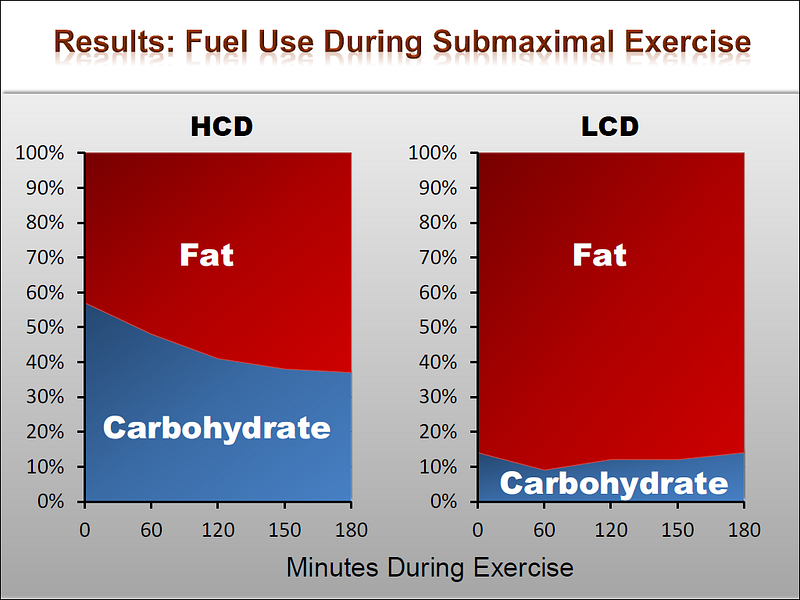
Low calorie (keto) diets was not effective in producing significant improvements in exercise performance at high intensity but they might be slightly better for endurance (time-to-exhaustion).
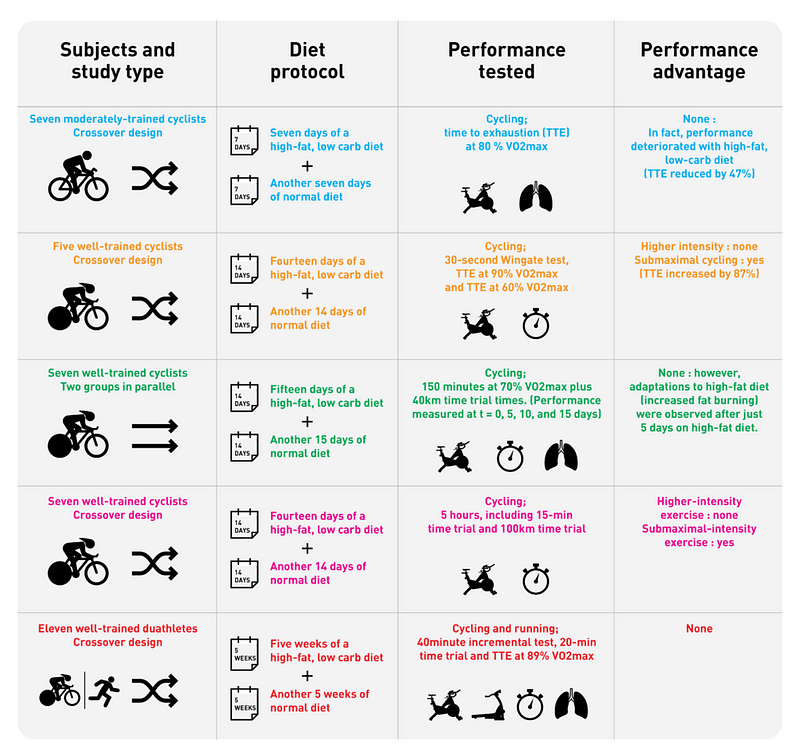
For example Terada that found an effect (16%) on time to exhaustion (LINK)
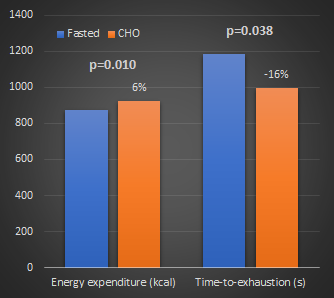
Is Fasted Training Harmful to Muscle?
Muscle loss is unlikely if you continue to train…in a study, also done during Ramadan, the fasted participants who engaged in cardio didn’t lose any lean mass by the end of the study period.
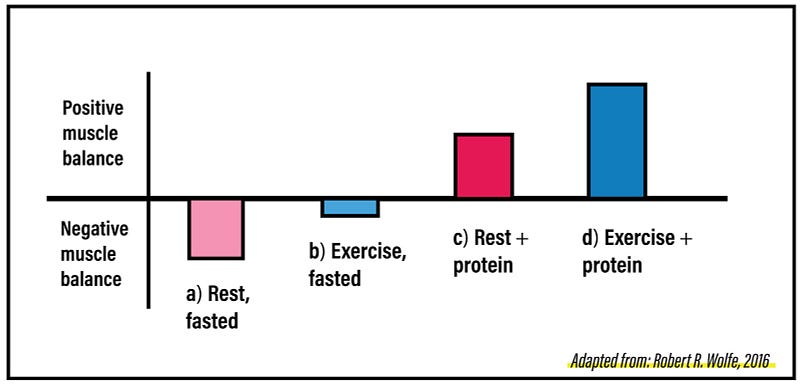
When you’re resting in a fasted state you are temporarily in a negative protein balance but this is reduced during fasted training and as soon as you consume protein (eg soon after finishing the workout) will be back in a positive protein balance. So as long as you’re consuming some protein by the end of the day, you don’t have to worry about muscle loss when training fasted.
What about Double Fasted Training?
(Sleep fasted & then train fasted) 
Two linked studies from French Institute of Sport used the “sleep low then train low” method over a three-week training period in a group of well-trained triathletes vs controls (and another in cyclists).Both groups consumed the same total amount of carbohydrates (6 g/kg/day), but at different times throughout the day (to manipulate CHO availability before and after the training sessions) and both groups has a fed high intensity session. This is also known as periodization of diet/carbs
Sleep low triathletes demonstrated greater improvements in 10 km time-trial running performance, cycling economy, and body composition as compared with the control group who regularly consumed carbohydrates before and during training (Marquet et al., 2016; see diagram below).
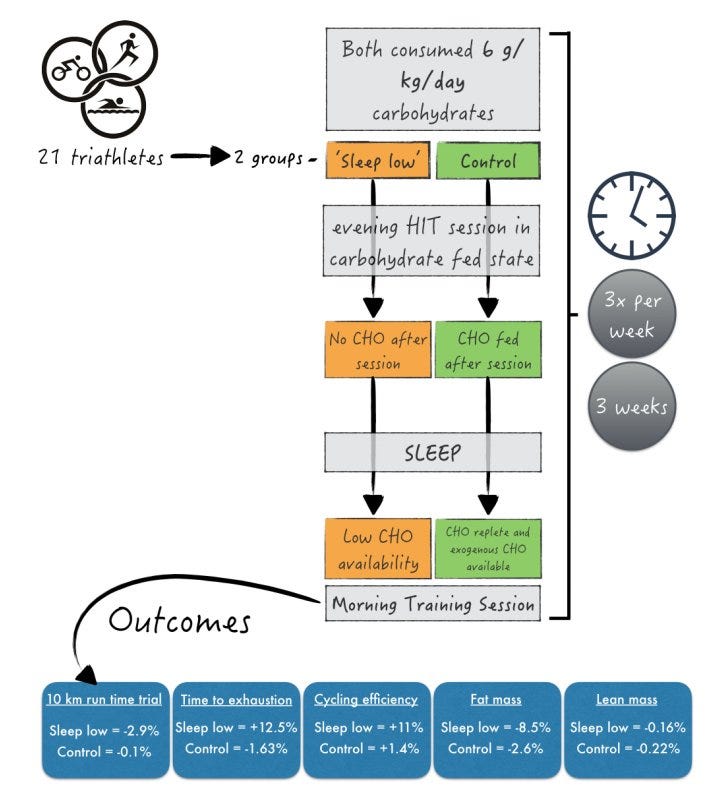
In the study involving cyclists, “sleep low” improved their performance (mean: +3.2% in time and 9% on power (229 to 250w) compared to CON and of note their improvement was associated with a change in pacing strategy with higher power output during the second part of the test
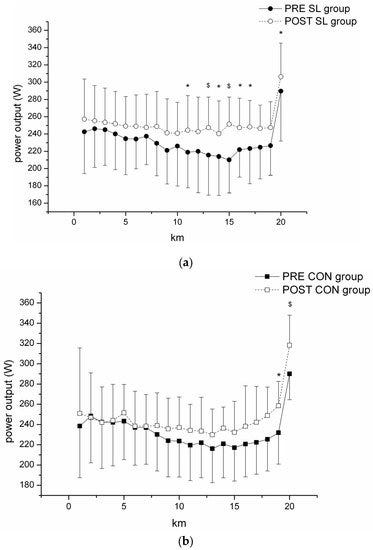
However, two follow-up studies (link) (link) have failed to replicate this finding so far……..
The Verdict on Fasted Training: take-home
- There is no difference in body composition changes (i.e. fat loss) when it comes to training fasted vs training fed
- There is no negative effect on muscle protein comes to training fasted vs training fed (providing you have a balanced diet later)
- There is likely a short term negative effect on performance (if you are not adjusted to it)…but this can be compensated by consuming caffeine (Silva-Cavalcante et al., 2013), and/or using a CHO mouth rinse (Kasper et al., 2016).
- Long term change to a low CHO/Keto diet will increase fatty acid oxidation which is likely to improve endurance and TTE
- If you are training fasted, try to get ~20–30g of protein after finishing the workout and eat a balanced diet overall
References
Ahlborg, G., & Felig, P. (1976). Influence of glucose ingestion on fuel-hormone response during prolonged exercise. Journal of Applied Physiology, 41(5 Pt. 1), 683–688. https://doi.org/10.1152/jappl.1976.41.5.683
Bruusgaard, J. C., Johansen, I. B., Egner, I. M., Rana, Z. A., & Gundersen, K. (2010). Myonuclei acquired by overload exercise precede hypertrophy and are not lost on detraining. Proceedings of the National Academy of Sciences, 107(34), 15111–15116. https://doi.org/10.1073/pnas.0913935107
Burke, L. M., Kiens, B., & Ivy, J. L. (2004). Carbohydrates and fat for training and recovery. Journal of Sports Sciences, 22(1), 15–30. https://doi.org/10.1080/0264041031000140527
Chakravarthy, M. V., & Booth, F. W. (2004). Eating, exercise, and “thrifty” genotypes: connecting the dots toward an evolutionary understanding of modern chronic diseases. Journal of Applied Physiology, 96(1), 3–10. https://doi.org/10.1152/japplphysiol.00757.2003
Hill, E. E., Zack, E., Battaglini, C., Viru, M., Viru, A., & Hackney, A. C. (2008). Exercise and circulating cortisol levels: the intensity threshold effect. Journal of Endocrinological Investigation, 31(7), 587–591. https://doi.org/10.1007/BF03345606
Horowitz, J. F., Mora-Rodriguez, R., Byerley, L. O., & Coyle, E. F. (1997). Lipolytic suppression following carbohydrate ingestion limits fat oxidation during exercise. The American Journal of Physiology, 273(4 Pt 1), E768–75.
Jeukendrup A. A Step Towards Personalized Sports Nutrition: Carbohydrate Intake During Exercise. Sports Medicine (Auckland, N.z). 2014;44(Suppl 1):25–33. doi:10.1007/s40279–014–0148-z.
Mattson, M. P. (2012). Energy Intake and Exercise as Determinants of Brain Health and Vulnerability to Injury and Disease. Cell Metabolism, 16(6), 706–722. https://doi.org/10.1016/j.cmet.2012.08.012
Paoli, A., Marcolin, G., Zonin, F., Neri, M., Sivieri, A., & Pacelli, Q. F. (2011). Exercising fasting or fed to enhance fat loss? Influence of food intake on respiratory ratio and excess postexercise oxygen consumption after a bout of endurance training. International Journal of Sport Nutrition and Exercise Metabolism, 21(1), 48–54.
Schoenfeld, B. J., Aragon, A. A., Wilborn, C. D., Krieger, J. W., & Sonmez, G. T. (2014). Body composition changes associated with fasted versus non-fasted aerobic exercise. Journal of the International Society of Sports Nutrition, 11(1), 54. https://doi.org/10.1186/s12970-014-0054-7
Vieira, A. F., Costa, R. R., Macedo, R. C. O., Coconcelli, L., & Kruel, L. F. M. (2016). Effects of aerobic exercise performed in fasted v. fed state on fat and carbohydrate metabolism in adults: a systematic review and meta-analysis. The British Journal of Nutrition, 116(7), 1153–1164. https://doi.org/10.1017/S0007114516003160
